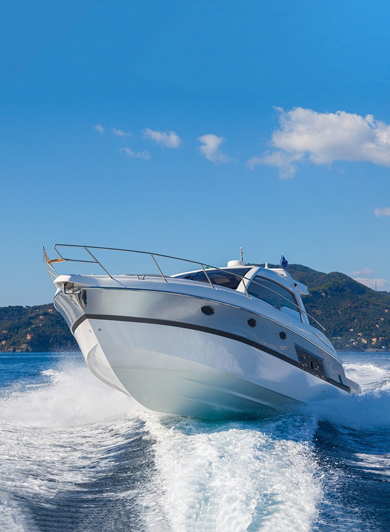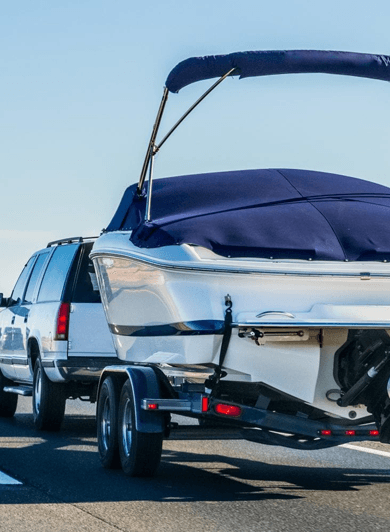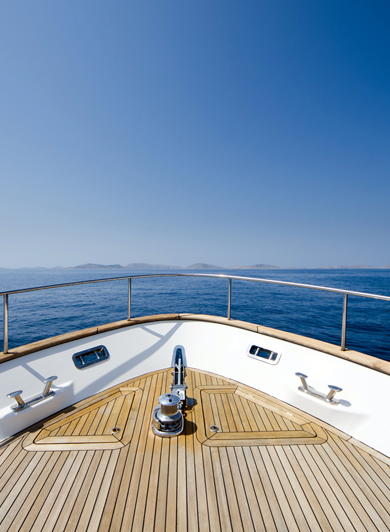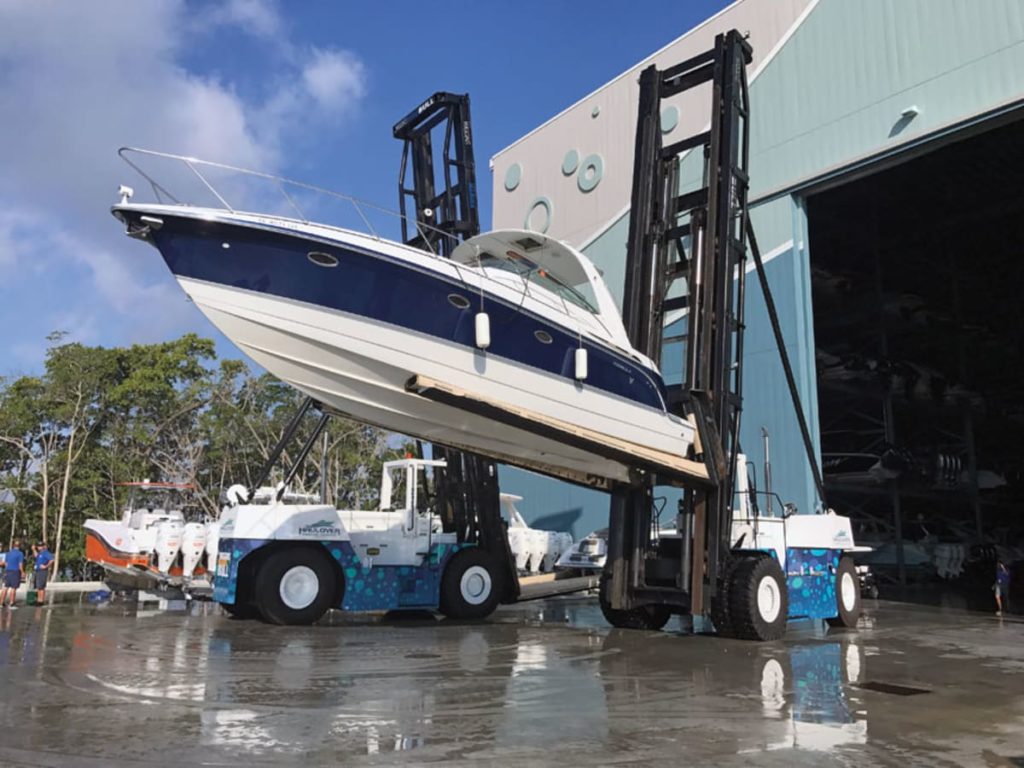Purchasing a new or used boat has a few unique challenges. Due to the common use in salt air and salt water, corrosion and hull structural issues need to be carefully viewed. Before you purchase any used boat we highly recommend that you have a knowledgeable repair person check over the boat. People who repair boats every day are the best people to spot HIDDEN or STORM damage someone else may miss. Boats in the Northeast are subject to the elements and harsh winter storms. In addition, galvanic corrosion and gelcoat blisters are becoming more common and are difficult to spot. Taking boats in and out of the water for winterization also puts unique stress on the hull and the hull to deck joints.
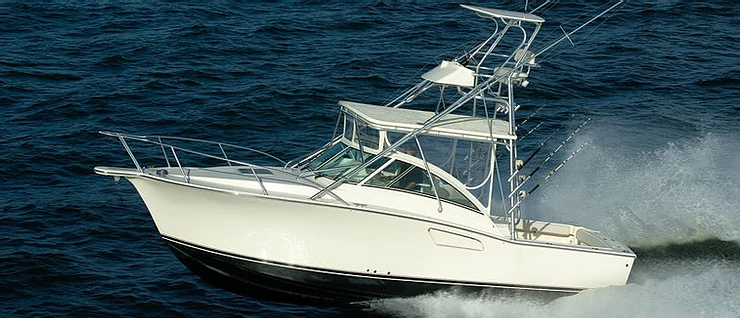
Pre-Purchase Survey
This is the most comprehensive type of survey and is strongly advised when purchasing either a new or used vessel. We also Thermal Image, Moisture Meter Test, and Color Light the boat to help determine the condition and overall operational condition of the vessel. We also cover structural integrity, electrical systems, the propulsion system, the fuel system, other machinery, navigation equipment, miscellaneous on-board systems, cosmetic appearance, electronics, and overall maintenance, as well as, an out of water inspection and a sea trial.
Insurance Survey
This inspection is performed so that the insurance company can determine whether or not the vessel is an acceptable risk. They are interested in the structural integrity and safety for the vessels intended use. Most insurance companies require a survey on older boats. They will also want to know the vessel’s fair market value.
Appraisal Survey
This inspection is performed to gather enough information to justify or determine the fair market value of the vessel. This is normally needed for financing, estate settlements, donations, and legal cases.
Damage Survey
This is performed to assess the extent of damage, recommend repairs, estimate repair cost, and if requested, possible cause. Hurricane and Storm Damage assessments are also one of our specialty’s.
However, due to all these issues, boats can be purchased at a great discount and you can end up with a fantastic boat at a great price!! Knowing what to look for is the KEY!!
Beware of the Following:
BOAT HULL
Excessive corrosion
Stress cracks by cleats or in transom corners
Stress cracks on stringers/frames
Waves down hull sides
BOAT PAINT/FINISH
Blisters
Paint or gelcoat chips
Dull spots in finish
Worn paint/gelcoat by cleats
Stress cracks in finish
BOAT ENGINE
Worn belts
Smoke at start-up
Rust by exhaust manifold attachment points
Rust color under motor in Bilge
BOAT ELECTRICAL
Dirty or discolored wires
Loose wires
Sloppy wire groups
Non-working lights or switches
Greenish wire discoloration
A boat with the any of the above should have a Pre-Purchase Inspection. Also, if you feel the boat has been damaged or has had a repair, get an Inspection. Below are some tips for the used boat buyer
Identify what boat you want, with as much detail as you can: type, length, power and brand.
Decide how much you can comfortably afford as a down payment, annual operation budget and monthly carrying cost for the boat you want.
Determine the range, both in years and engine hours of the boats you can afford that meets the criteria established in #1 and #2. Use Internet classified websites to determine about how much your dream boat is selling for.
Now, determine the condition of the boats that fall into this group. Obviously, you should be looking for the newest boat in the best condition with the lowest engine hours
Are there any transferrable warranties left on any of the boats offered for sale? If so, what are they worth? If not, you generally can buy service contracts on boats built during the last six years. You can investigate this yourself. (Go to the internet to find out how much a service contract will cost.)
Why is this boat being sold and what is its history? It is important that you know the “provenance” (list of owners and its relevant history since it was first sold) of the boat you buy. There are many apparently “good deals” – even “steals” – on the market. “Apparently” is the key word here. Some are, in fact, stolen. Some have gone through a hurricane, been bought as salvage, fixed and offered for sale. Some have been repossessed from owners who neglected the boats for years and finally stopped making payments. Generally, boats owned by a single owner are more desirable than those which have been passed through several hands.
a. Check the HIN, (Hull Identification Number), and make sure it has not been tampered with.
b. Get copies of the title, registration or documentation and bills of sale.
c. Try to get maintenance records. Owners of well-maintained boats will often have them.
d. Make sure the seller owns the boat.
How is the boat equipped? First, make sure all required and necessary equipment is on the boat and in good working order. Second, with so many boats on the market you can generally find boats that have not only everything required, but also virtually everything you will need or want.
Make a detailed and careful inspection. (Hire a repair expert to look it over). You are looking for clues of neglect, damage, poor construction, and harsh use and abuse. Examine obvious features such as the gel-coat, woodwork and upholstery. If these haven’t been maintained then there’s a good chance the rest of the boat has not had much care either. Is there ge coat cracking and “spiders” or “cobwebs” at corners? Look for rust in the engine room, oil under the engine, old or soft hoses. Look for water lines inside the boat or on the engine. These indicate that the boat has flooded in the past.
Check that all the control cables (for steering, throttle, etc.) are in good working order.
Open and close all the hatches and sea cocks to ensure they’re in good working order. Water marks inside the hatches would indicate that they are no longer water-tight.
You should test all the systems such as bilge pump, winches, freshwater system, lights, heater and air conditioning, generator, stove etc.
Check that all hardware is attached firmly and that electrical items and connections are free from rust and corrosion.
Time for a professional inspection. Once you have found a boat you want to buy, have done your own inspection, and you have negotiated a satisfactory price, then you need to have the boat and engine inspected by an expert. Hiring a professional is worth the money. A REPAIR Professional who is also a Marine Surveyor, like Cardona Maine Surveys is your best bet. Get someone who repairs boat on a regular basis. They know what to look for.
No matter what the price of the boat, money spent on good inspections will help insure (but not guarantee) that you know what you are buying. A good place to start is The Association of Certified Marine Surveyors (ACMS), www.acms-usa.com or U.S. Surveyors Association www.navsurvey.com A full survey is not always necessary to see if a boat is a “Good Buy”. Sometimes a speaking with a Boat Review company like Cardona Marine surveys, that also maintains a database of “Boats to Be Aware of” due to structural issues, or things that typically break after only a few years of use is all you need.
Basic CHECKLIST
1) Check out floor walk on it; bounce, does it flex? Spongy or Soft spots, are not good.
2) Check hatches, doors for stains/water drips.
3) Check transom for cracks/ look for movement.
4) Look in bilge for cracks in stringers/frames of boat.
5) Check hull to deck joints for gaps, damage.
6) Check screws around rub rail for loose screws.
7) Check service records on motor.
8) Pull dipstick, check oil for water or metal.
9) Check for belt dust around pulleys.
10) Check lower unit/transmission oil for water in it.
11) Check steering for full rotation.
12) Check shift/throttles for full movement.
13) Start motor, listen for knocks, pings etc.
14) Check motor temp when warm.
15) Check over wiring for damage, stains.
16) Check that all switches/electronics work.
17) Ask owner for previous survey.
18) Verify all paperwork, title, registration, check HIN.
19) Go for sea trial.
Cardona Marine Surveys is pleased to provide this guide as a starting point for your boat purchase. We strongly feel that every used boat purchased should be looked over by someone who repairs boats on a daily basis. Due to all the Storm damaged boats on the market, it is very important that you do not end up with hidden damage that may cost thousands of dollars to fix. However, some of these storm damaged boats may be a cost effective way to own a larger boat for just a few small repairs. Pre-purchase inspections are an excellent starting point for determining if a boat is in good shape and/ or if it is cost effective to purchase.
Boating should be fun and allow you and your family a way to get out and explore the fantastic water that we are so fortunate to have. We wish you much success and happy boating with your new or used boats.
Please feel free to contact us directly with any questions that you may have or to schedule a pre-purchase inspection or insurance survey.
© 2023 Cardona Marine Surveys. Site Designed with the assistance of Mimvi.

